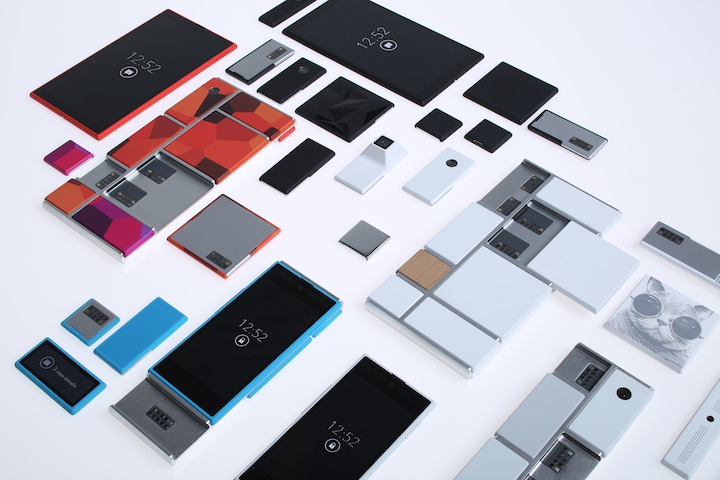Is Google’s Ara modular smartphone the next revolution in mobile devices, or a cynical ploy to refresh the company’s brand as an innovator? It depends who you listen to. Google’s modular Ara, which began in the company’s ATAP skunkworks program, is on the verge of shipping a developer kit, with a consumer version slated for 2017. The modular device allows users to add or replace a wide-angle or telephoto camera module, a larger battery or E Ink displays; modules can be developed by third parties.
On one side of the debate, Wired says Ara is revolutionary because it allows anyone to contribute to building the phone’s ecosystem. The user can buy or replace modules over time, upgrading cameras or speakers for example.
The path to prototype has been rocky; at last year’s Google I/O conference, the Ara team demonstrated a “grainy photo of the audience with a hot-swapped camera module,” after which Project Ara released no more news until now. Today, however, Google no longer considers Ara to be an experimental program, but is now its own division in the company.
The Ara Developer Edition that will ship later this year is a 5.3-inch “big, thick Android phone with a bunch of weird exposed ports, but normal nonetheless.” The team redesigned the connectors on the back, so that modules could be standardized. The six proprietary ports use an open standard, UniPro, each of which can push up to 11.9 gigabits per second in both directions. And it consumes one-third as much power as USB 3.
The modules can range from pro-level cameras to “style” modules for aesthetics. Bottom line: anything bigger than the smallest module could be an Ara device, including an Internet of Things device or tablet.
TechCrunch has a different take on the Ara smartphone: “Google’s project Ara modular smartphone concept is — for all intents and purposes — dead.” It all boils down to whether or not you think there’s a future for a modular phone, an idea that Wired seems to embrace and TechCrunch finds dubious.
First noting that Google has been promising a modular phone since 2013, TechCrunch sheds doubt on whether the Ara will actually ever roll out. And then there’s its basic concept: “modularity is necessarily a minority passion. The mainstream isn’t half so keen on needing to physically configure their high tech kit before they can use it as they wish.”
Further, TechCrunch quotes lead Ara engineer, Rafa Camargo as saying that, “When we did our user studies, what we found is that most users don’t care about modularizing the core functions.” For modularity, it points to Fairphone, whose Android smartphone (on the market for €525) is “designed for repairability,” with spare parts that can be swapped out.
If and when Ara ships, says TechCrunch, only a niche audience will embrace it, most importantly for Google “feeding the company’s wider brand narrative for multiple years.”


No Comments Yet
You can be the first to comment!
Sorry, comments for this entry are closed at this time.